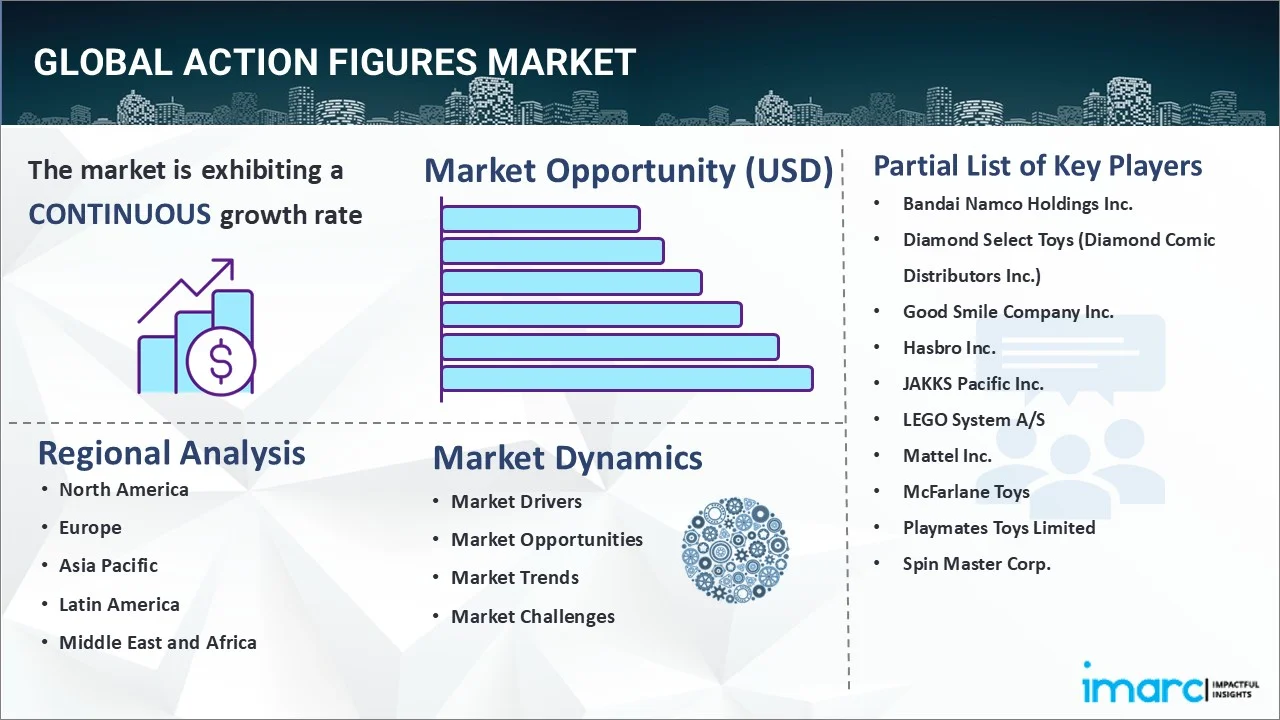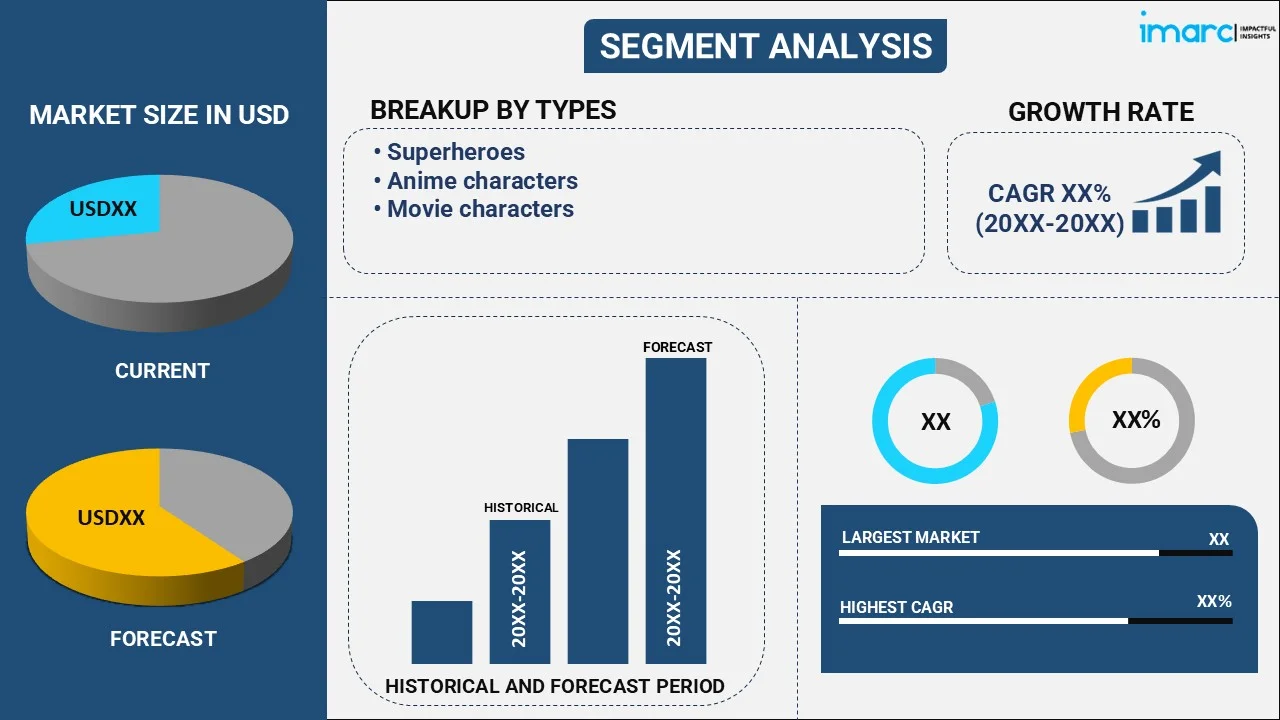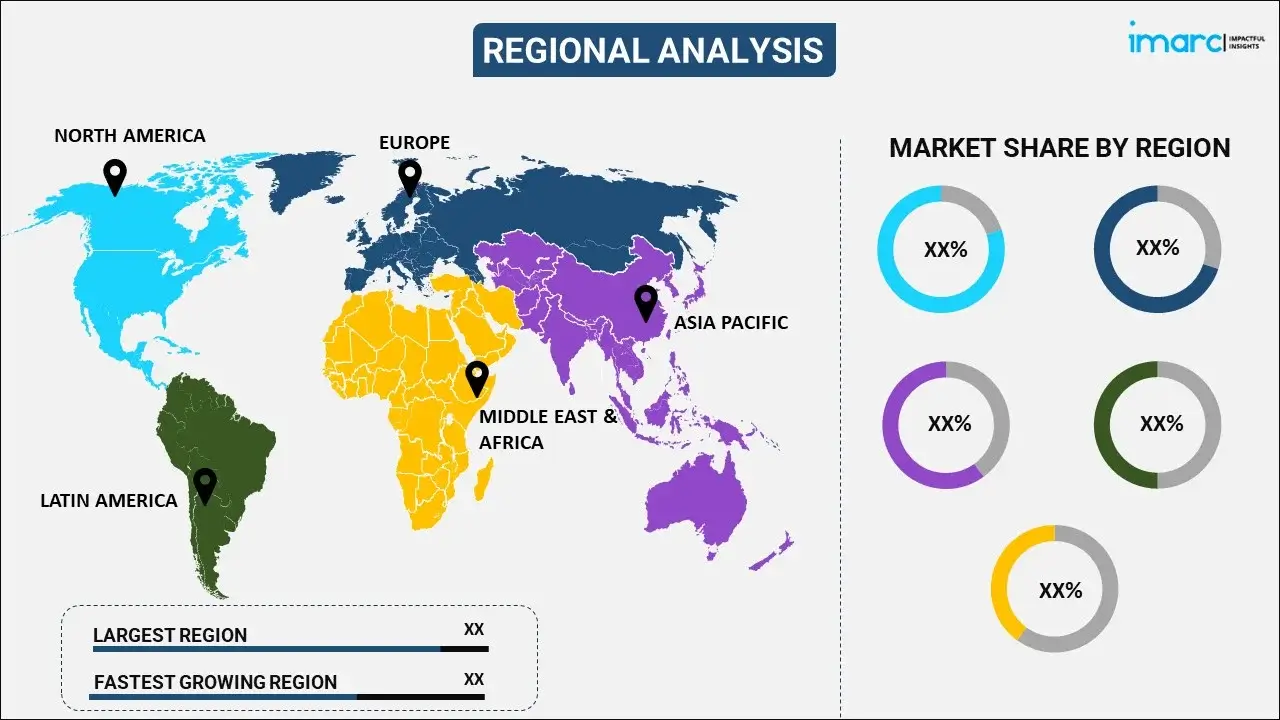
Action Figures Market Report by Type (Superheroes, Anime Characters, Movie Characters), Distribution channel (Offline, Online), End User (Up to 8 years, 9-15 years, 15 years and Above), and Region 2025-2033
Market Overview:
The global action figures market size reached USD 9.7 Billion in 2024. Looking forward, IMARC Group expects the market to reach USD 18.5 Billion by 2033, exhibiting a growth rate (CAGR) of 6.87% during 2025-2033. The popularity of franchises, nostalgic appeal and collectibility for adult collectors, strategic marketing efforts, licensing partnerships, enhanced design and innovation, online accessibility, fan engagement, and exclusive releases are some of the major factors propelling the market.
|
Report Attribute
|
Key Statistics
|
|---|---|
|
Base Year
|
2024 |
|
Forecast Years
|
2025-2033
|
|
Historical Years
|
2019-2024
|
| Market Size in 2024 | USD 9.7 Billion |
| Market Forecast in 2033 | USD 18.5 Billion |
| Market Growth Rate (2025-2033) | 6.87% |
Action figures are collectible toys that represent characters from various forms of media, such as movies, TV shows, video games, and comics. These figures are typically made of plastic and are designed to resemble specific characters with detailed sculpting and articulation. Action figures cater to a wide range of interests, including superheroes, sci-fi/fantasy characters, and sports icons. Action figures serve as a popular form of entertainment for both children and adult collectors. They allow fans to bring their favorite characters to life, reenact scenes from their favorite media, and engage in imaginative play. These figures often come with accessories like weapons, vehicles, and interchangeable parts, enhancing their playability and customization options. They have gained immense popularity over the years, with numerous franchises and licensed properties producing a vast array of collectibles. They are marketed through various channels, including toy stores, online retailers, and conventions. Collectible action figures have also become a significant market for enthusiasts, with limited-edition releases and rare variants commanding high prices in the market.

To get more information on this market, Request Sample
The success and popularity of movies, TV shows, video games, and comic books play a significant role in driving the market. Characters from these franchises have a dedicated fan base that seeks to own action figures as a way to connect with their favorite media and express their fandom. Additionally, action figures often tap into the nostalgia of adult collectors who grew up with iconic characters and franchises. The desire to relive childhood memories and build comprehensive collections fuels demand. Limited-edition releases, special variants, and exclusive figures further drive the collectability aspect, enticing enthusiasts to acquire rare and unique pieces. Other than this, effective marketing campaigns by toy manufacturers and licensors contribute to the market growth. Strategic partnerships, promotional tie-ins, and engaging advertising help generate awareness, create buzz, and increase consumer interest in specific action figure lines. Besides this, advancements in manufacturing technologies allow for more intricate and detailed action figures. Improved sculpting techniques, realistic facial expressions, and high-quality paint applications enhance the overall appeal of the figures. This attention to detail and craftsmanship attracts collectors who appreciate the aesthetic value of action figures.
Action Figures Market Trends/Drivers:
Popularity of Franchises
The market is heavily influenced by the popularity of franchises across various media. Successful movies, TV shows, video games, and comic book series with a strong fan base often translate into high demand for related action figures. For example, the Marvel Cinematic Universe has spurred a massive market for action figures featuring its iconic superheroes like Iron Man, Spider-Man, and Captain America. The fan loyalty and emotional attachment to these characters drive collectors and fans to seek out action figures as a way to celebrate and showcase their affinity.
Nostalgia and Collectibility
Nostalgia plays a significant role in driving the action figure market, particularly among adult collectors. Many individuals who grew up in the 1980s and 1990s have fond memories of playing with action figures featuring characters from popular franchises like Star Wars, G.I. Joe, and Transformers. As adults, they seek to relive those childhood experiences and build collections that evoke a sense of nostalgia. The desire to complete collections, acquire rare figures, and participate in trading and conventions further fuels the collectibility aspect of action figures, driving demand in the market.
Marketing and Promotion
Toy manufacturers and licensors invest in strategic partnerships, advertising campaigns, and promotional tie-ins to create awareness and generate excitement for new action figure releases. Collaborations with media outlets, influencers, and celebrities help reach target audiences and build anticipation. Promotional events, conventions, and toy fairs provide opportunities for fans and collectors to interact with manufacturers, preview upcoming releases, and make purchasing decisions. The marketing efforts effectively target both existing collectors and new consumers, stimulating demand and driving sales in the action figure market.
Action Figures Industry Segmentation:
IMARC Group provides an analysis of the key trends in each segment of the global action figures market report, along with forecasts at the global, regional, and country levels from 2025-2033. Our report has categorized the market based on type, distribution channel, and end user.
Breakup by Type:

- Superheroes
- Anime characters
- Movie characters
Superheroes dominate the market
The report has provided a detailed breakup and analysis of the market based on the type. This includes superheroes, anime characters, and movie characters. According to the report, superheroes represented the largest segment.
The widespread popularity of superhero characters, both in comic books and in movies, has created a massive fan base around the world. Iconic superheroes like Superman, Batman, Spider-Man, and Wonder Woman have become cultural symbols, appealing to people of all ages and backgrounds. Additionally, the success of the Marvel Cinematic Universe (MCU) and DC Extended Universe (DCEU) has played a significant role in boosting the demand for superhero action figures. These cinematic universes have produced a string of highly successful and visually stunning superhero films that have captured the imagination of audiences globally. The movies often spark excitement and anticipation for new action figures, driving collectors and fans to purchase them. Furthermore, advancements in manufacturing technology have allowed for the creation of highly detailed and realistic action figures. With improved sculpting techniques and high-quality materials, superhero action figures can closely resemble their on-screen counterparts, enhancing their appeal among collectors and enthusiasts. The rise of social media and online communities has also contributed to the popularity of superhero action figures. Fans can connect and share their love for superheroes, leading to increased visibility and demand for related merchandise, including action figures.
Breakup by Distribution Channel:
- Offline
- Online
Offline channels hold the largest share in the market
A detailed breakup and analysis of the market based on the distribution channel has also been provided in the report. This includes offline and online. According to the report, offline accounted for the largest market share.
Traditional brick-and-mortar retail stores have established a strong presence over the years, allowing consumers to have a tactile experience with the products. This hands-on approach allows potential buyers to examine the action figures closely, assess their quality, and make informed purchasing decisions. Furthermore, offline retail stores often provide a social and immersive shopping experience. Fans and collectors can interact with knowledgeable store staff or fellow enthusiasts, creating a sense of community and fostering a deeper connection with the hobby. Physical stores also offer the advantage of immediate gratification, as customers can purchase and take home their desired action figures instantly. Another reason for the dominance of offline distribution is the availability and variety of product offerings. Physical stores tend to have a wider range of action figures compared to online platforms, allowing customers to browse and choose from a diverse selection of characters, series, and exclusive collectibles. While online sales have gained significant traction, particularly with the growth of e-commerce platforms, the offline segment continues to hold the largest share in the market due to the unique shopping experience, social interaction, and immediate accessibility it provides to action figure enthusiasts.
Breakup by End User:
- Up to 8 years
- 9-15 years
- 15 years and above
9-15 years dominate the market
The report has provided a detailed breakup and analysis of the market based on the end user. This includes up to 8 years, 9-15 years, and 15 years and above. According to the report, 9-15 years represented the largest segment.
This age range aligns with a crucial stage of childhood and adolescence, where children develop a strong interest in imaginative play, storytelling, and role-playing. Action figures provide an avenue for children to bring their favorite characters to life and engage in immersive play experiences. Additionally, action figures often cater to the interests and preferences of this age group. Popular action figure franchises, such as superheroes, animated series, and movie tie-ins, tend to resonate strongly with children between the ages of 9 and 15. These characters and franchises often become significant influences in their lives, driving the demand for action figures associated with them. Furthermore, children in this age range have greater autonomy and purchasing power compared to younger age groups. They can make independent choices and express their preferences, making them an attractive target market for action figure manufacturers and retailers. The 9-15 age group also falls within the prime age for collecting hobbies. Many children start building collections of action figures during this period, developing a passion for seeking out new additions and completing sets.
Breakup by Region:

- North America
- United States
- Canada
- Europe
- Germany
- France
- United Kingdom
- Italy
- Spain
- Others
- Asia Pacific
- China
- Japan
- India
- South Korea
- Australia
- Indonesia
- Others
- Latin America
- Brazil
- Mexico
- Others
- Middle East and Africa
North America exhibits a clear dominance in the market
The report has also provided a comprehensive analysis of all the major regional markets, which include North America (the United States and Canada); Europe (Germany, France, the United Kingdom, Italy, Spain, and others); Asia Pacific (China, Japan, India, South Korea, Australia, Indonesia, and others); Latin America (Brazil, Mexico, and others); and the Middle East and Africa. According to the report, North America was the largest market for action figures.
North America has a rich history and strong cultural affinity towards action figures and superheroes. The region has been the birthplace and home to major comic book publishers, such as Marvel and DC Comics, and has produced iconic characters like Superman, Batman, and Spider-Man. This longstanding cultural connection has fostered a large and dedicated fan base that drives demand for action figures. Additionally, North America boasts a robust entertainment industry, including Hollywood, which produces a significant number of blockbuster movies featuring superheroes and other action-oriented franchises. These films generate immense excitement and popularity, translating into increased demand for associated merchandise, including action figures. Moreover, North America has a highly developed retail infrastructure, with numerous specialized stores, toy retailers, and large-scale chain stores dedicated to selling action figures. The accessibility and availability of a wide range of action figures contribute to the region's market dominance. Furthermore, North America's high disposable income levels and consumer spending power allow for greater purchasing capacity, making it a lucrative market for action figure manufacturers and retailers.
Competitive Landscape:
Key players in the market often secure licensing agreements and partnerships with major entertainment companies, film studios, gaming companies, and sports organizations. These collaborations allow them to produce action figures based on popular franchises, characters, and athletes, tapping into existing fan bases and expanding their market reach. For example, Hasbro's partnership with Marvel Studios has resulted in a vast range of action figures featuring characters from the Marvel Cinematic Universe, capitalizing on the franchise's immense popularity. Additionally, manufacturers continuously strive to improve the design and innovation of their products. They invest in advanced sculpting techniques, improved articulation systems, and high-quality materials to enhance the overall aesthetics and playability of the figures. These efforts cater to collectors and enthusiasts who appreciate the attention to detail and seek out the product with superior quality. For instance, companies like NECA (National Entertainment Collectibles Association) are known for their highly detailed and movie-accurate action figures, appealing to collectors looking for premium collectibles. Other than this, recognizing the shift in consumer behavior toward online shopping, key players in the market have strengthened their online presence and embraced e-commerce platforms. They establish official websites, online stores, and partnerships with popular online retailers, ensuring easy accessibility and availability of their products to a global audience. Online platforms also provide opportunities for direct engagement with collectors, offering exclusive releases, pre-orders, and limited-edition figures. For instance, companies like Sideshow Collectibles and BigBadToyStore have developed robust online platforms catering to collectors' needs, featuring a wide range of action figures and related merchandise.
The report has provided a comprehensive analysis of the competitive landscape in the market. Detailed profiles of all major companies have also been provided. Some of the key players in the market include:
- Bandai Namco Holdings Inc.
- Diamond Select Toys (Diamond Comic Distributors Inc.)
- Good Smile Company Inc.
- Hasbro Inc.
- JAKKS Pacific Inc.
- LEGO System A/S
- Mattel Inc.
- McFarlane Toys
- Playmates Toys Limited
- Spin Master Corp.
Action Figures Market Report Scope:
| Report Features | Details |
|---|---|
| Base Year of the Analysis | 2024 |
| Historical Period | 2019-2024 |
| Forecast Period | 2025-2033 |
| Units | Billion USD |
| Scope of the Report | Exploration of Historical and Forecast Trends, Industry Catalysts and Challenges, Segment-Wise Historical and Predictive Market Assessment:
|
| Types Covered | Superheroes, Anime Characters, Movie Characters |
| Distribution Channels Covered | Offline, Online |
| End Users Covered | Up to 8 years, 9-15 years, 15 years and Above |
| Regions Covered | Asia Pacific, Europe, North America, Latin America, Middle East and Africa |
| Countries Covered | United States, Canada, Germany, France, United Kingdom, Italy, Spain, China, Japan, India, South Korea, Australia, Indonesia, Brazil, Mexico |
| Companies Covered | Bandai Namco Holdings Inc., Diamond Select Toys (Diamond Comic Distributors Inc.), Good Smile Company Inc., Hasbro Inc., JAKKS Pacific Inc., LEGO System A/S, Mattel Inc., McFarlane Toys, Playmates Toys Limited, Spin Master Corp., etc. |
| Customization Scope | 10% Free Customization |
| Post-Sale Analyst Support | 10-12 Weeks |
| Delivery Format | PDF and Excel through Email (We can also provide the editable version of the report in PPT/Word format on special request) |
Key Benefits for Stakeholders:
- IMARC’s report offers a comprehensive quantitative analysis of various market segments, historical and current market trends, market forecasts, and dynamics of the action figures market from 2019-2033.
- The research study provides the latest information on the market drivers, challenges, and opportunities in the global action figures market.
- The study maps the leading, as well as the fastest-growing, regional markets. It further enables stakeholders to identify the key country-level markets within each region.
- Porter's five forces analysis assist stakeholders in assessing the impact of new entrants, competitive rivalry, supplier power, buyer power, and the threat of substitution. It helps stakeholders to analyze the level of competition within the action figures industry and its attractiveness.
- Competitive landscape allows stakeholders to understand their competitive environment and provides an insight into the current positions of key players in the market.
Key Questions Answered in This Report
The global action figures market was valued at USD 9.7 Billion in 2024.
The action figures market is projected to reach USD 18.5 Billion by 2033, exhibiting a growth rate (CAGR) of 6.87% during 2025-2033.
The action figures market is mainly driven by the success of popular media franchises, such as movies, TV shows, and video games, which create large fan bases. The nostalgic appeal among adult collectors, who wish to relive childhood memories, significantly fuels demand. Additionally, strategic marketing efforts, licensing partnerships, and the constant innovation in figure design and articulation further boost the market's growth. Limited-edition releases and the rise of online retail channels have also played key roles in expanding market reach.
North America currently holds the largest share of the action figures market, supported by its cultural affinity for action figures, the dominance of major media franchises, and strong retail infrastructure.
Some of the major players in the action figures market include Bandai Namco Holdings Inc., Diamond Select Toys (Diamond Comic Distributors Inc.), Good Smile Company Inc., Hasbro Inc., JAKKS Pacific Inc., LEGO System A/S, Mattel Inc., McFarlane Toys, Playmates Toys Limited, Spin Master Corp., etc.
Need more help?
- Speak to our experienced analysts for insights on the current market scenarios.
- Include additional segments and countries to customize the report as per your requirement.
- Gain an unparalleled competitive advantage in your domain by understanding how to utilize the report and positively impacting your operations and revenue.
- For further assistance, please connect with our analysts.
 Request Customization
Request Customization
 Speak to an Analyst
Speak to an Analyst
 Request Brochure
Request Brochure
 Inquire Before Buying
Inquire Before Buying




.webp)




.webp)












